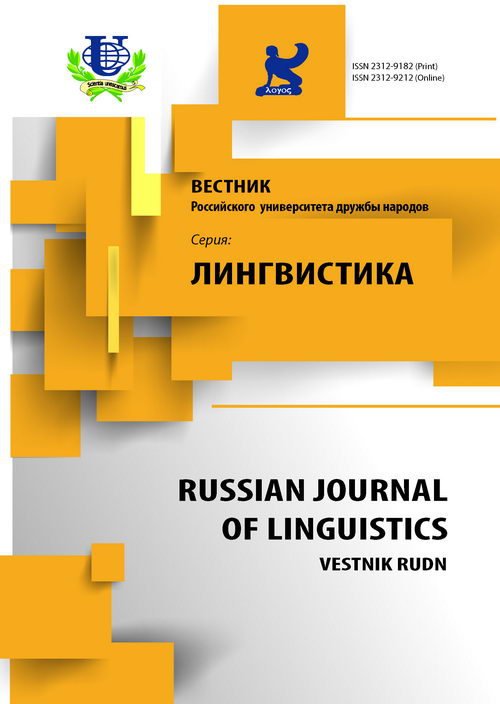No 4 (2013)
- Year: 2013
- Articles: 16
- URL: https://journals.rudn.ru/linguistics/issue/view/586
Articles
To the problem of Court Interpreter’s Code of Ethics
Abstract
This article focuses on identification of specific features of court interpreting regarded as a tool of human rights provision in criminal proceedings. The article also deals with detailed analysis of Court Interpreter’s Code of Ethics and possibility of its application in Russia.
Russian Journal of Linguistics. 2013;(4):5-10
 5-10
5-10


 11-17
11-17


To the problem of creating a specialized glossary of academic terms
Abstract
The article examines the issue of linguistic representation of academic terms by the example of realities used in Peoples’ friendship university of Russia and shows various linguistic means in English and Russian languages used for translation of several lexical and semantic groups of the terms of higher education.
Russian Journal of Linguistics. 2013;(4):18-23
 18-23
18-23


Some variants of translating Russian realia into the western culture (on the materials of English newspapers)
Abstract
There is no any unique approach to the understanding of the notion “culture-specific vocabulary”. The main techniques used for its translation include transcription, transliteration, loan-translation and mixed methods. The article contains a lot of examples.
Russian Journal of Linguistics. 2013;(4):24-31
 24-31
24-31


 32-38
32-38


 39-45
39-45


 46-58
46-58


Interdiscourse communication: the linguistic relativity perspective
Abstract
The paper concerns the phenomenon of interdiscourse communication and views it from the perspective of Linguistic Relativity Theory. The goal of the paper is to analyse the linguistic behaviour of non-native language users, who apply the English language for instrumental purposes in interaction, which establishes in multinational discourse among interactants having different cultural backgrounds. The paper reports on some of the research results that were acquired in the period from 2011 to 2013 during the ERASMUS Intensive Programme project Cross-Cultural Competence and Interaction . The focus of the study was on analysing the linguistic and pragmatic strategies prioritised by the tertiary level Latvian and Lithuanian interactants for whom the English language served as the instrument of communication in the multinational discourse community, which was constructed of students from Latvia, Lithuania and Turkey. The research findings reveal that non-native language users having the cultural background of the Baltic States construct their own mode of interaction related to the linguistic behaviour, in which the interactants apply clarity and directness as the prevailing strategies of interdiscourse communication.
Russian Journal of Linguistics. 2013;(4):59-71
 59-71
59-71


 72-79
72-79


 80-92
80-92


Comparative analysis of semantic structure of cognate derivatives
Abstract
The article analyses cognate deverbal nouns belonging to the verb family “brat” (to take/to get). The research reveals different semantic structures of deverbal nouns motivated by various verbs with prefixes. Semantic paradigm of derivatives is determined by semantic valencies of motivating verbs and derivational formant.
Russian Journal of Linguistics. 2013;(4):93-101
 93-101
93-101


Comparison of disyllabic words prosody in Russian and Chinese languages
Abstract
In this article the results of the computer-acoustic analysis of disyllabic Chinese words and the results of the study on prosody of disyllabic Russian words by professor Zlatoustova are compared; similarities and differences in prosodic word structures are exposed.
Russian Journal of Linguistics. 2013;(4):102-108
 102-108
102-108


The speech act of invitation in the American and Russian communicative cultures (results of an empirical research)
Abstract
This paper deals with the features of the speech act of Invitation in the American and Russian communicative cultures. Based on an empirical research, it compares the communication strategies and the linguistic means Americans and Russians use when making an invitation.
Russian Journal of Linguistics. 2013;(4):109-115
 109-115
109-115


The formation of the Chinese terminology: tradition and modernity
Abstract
The article deals with the analysis of the characteristics of modern Chinese terminology. It also considers the Confucian philosophical conception «正名», «Zhengming». The term “Zhengming”, meaning rectification of names, was coined by Confucius for the purpose of establishing order and stability in society through correct use of language. The analysis of this conception provides to observe the role of this Confucian tradition in the building of modern Chinese terminology .
Russian Journal of Linguistics. 2013;(4):116-125
 116-125
116-125


 126-128
126-128


Our authors
Russian Journal of Linguistics. 2013;(4):129-130
 129-130
129-130
















